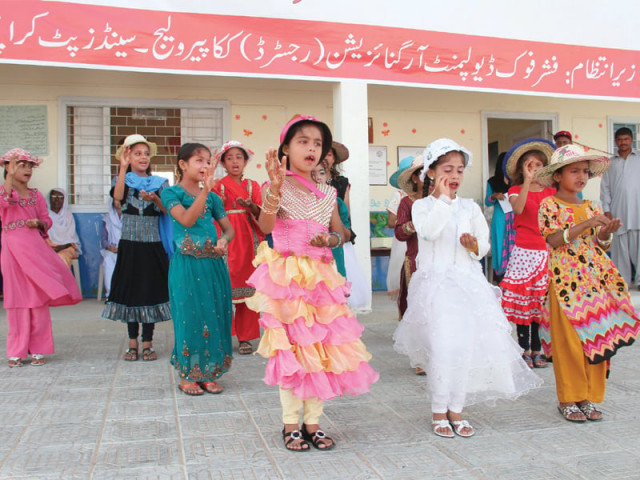Renewed life in Kakapir school as students graduate
Late social worker Abdul Ghani knocked on doors to get parents to send their children to school.

Children perform skits at the prize distribution ceremony for the students graduating from the Kakapir village school on Saturday. Five girls graduated from the primary school at the occasion. PHOTO COURTESY QADRI
The fourth batch of primary school students of the Government Boys and Girls Primary School, Kakapir, graduated on Saturday. A certificate distribution ceremony was organised by the Fisherfolk Development Organization (FDO) and ICI Pakistan to encourage the area’s residents to send their children to school.
Around 2,000 families - mostly those of fishermen - live in Kakapir, one of the city’s oldest neighbourhoods. Around a decade ago, its residents felt learning how to fish was more valuable than what could be gleaned from a classroom. That’s why children could often be found wading in shallow waters and boats instead of poring over textbooks.
It isn’t surprising that the institution turned into a ghost school a few years after it was inaugurated in 1994. A social worker residing in the village, Abdul Ghani, was dismayed by the dwindling number of students and decided to take matters into his own hands. Mohammad Bashir, a member of the not-for-profit FDO, said, “Ghani approached ICI Pakistan and got them to help out with the renovation of the school. He also knocked on people’s doors to create awareness about the importance of education.”

Slowly, his efforts started bearing fruit - the school’s empty halls are now full of activity as 150 children attend classes there. Sadly, Ghani is no longer around to see how things have picked up since he got the ball rolling: he was killed by land-grabbers last year, said Bashir.
On Saturday evening the school was far from deserted. The unpaved ground floor of the double-storey school was full of children clad in colourful costumes who performed plays and songs while their parents, seated on straw mats, watched gleefully.
Sixty-year-old Gul Mohammad, a fisherman, was there to see his daughter Khadija, a first grader, perform. “My four elder sons are illiterate and tag along with me when I go fishing but Khadija is getting an education because I have become aware of the curse of illiteracy. I can’t count money because I am illiterate and neither can my sons.”
Kulsoom, 67, was also clapping for her granddaughter who was dressed in a peacock costume for a tableau. “Social worker Abdul Ghani reasoned with us to send our children to school so that they could help the village become a better place,” she said in broken Urdu.
Ghani’s daughter Ayesha, who completed her primary education from the school, told The Express Tribune that she is trying to carry on her father’s mission. “It is because of the struggles and efforts of my father that the school has opened its doors once again and education is no longer considered useless in the area,” she said. Ayesha is now FDO’s vice president and a sophomore at college.
“The government has sent two teachers for the school two years back but one of the two has not yet visited it. The other one visits occasionally. We need the education department to provide the school with facilities such as water and electricity as well as proper staff.” Ayesha added the school is the only one in the village and cannot educate more than 150 students at a time because it is understaffed and under-resourced.
ICI Pakistan’s vice president of Human Resources, Asif Malik, who was the chief guest, vowed to support the school and remembered Ghani’s efforts in reviving the school.
Published in The Express Tribune, May 27th, 2013.



















COMMENTS
Comments are moderated and generally will be posted if they are on-topic and not abusive.
For more information, please see our Comments FAQ